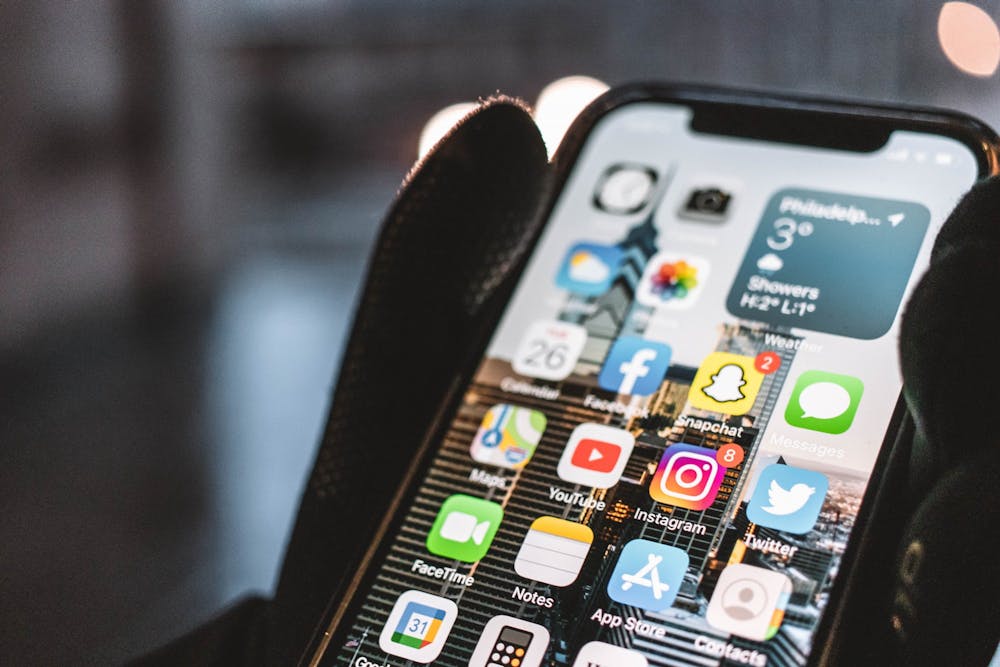At a summer camp in the suburbs of St. Louis, children are not allowed to have their phones. Scattered across the playground, they trade Pokémon cards and make up dual-syllable languages. One group, squeezed around one tower, plays Taco, Cat, Goat, Cheese, Pizza. Another makes rainbow looms. As much as I do not understand “me-me,” retreat costs, or the camp-wide popularity of Frozen 2, I communicate with these children comfortably.
Less than two decades ago, places like Camp Webegee were not anomalous, but normal. In those ancient days, when humans did not socialize over messages or FaceTime, they found each other in person, without alluring distractions. Friends saw each other for coffee or a walk in the park just as neighbors gathered around a dinner table or crowded chairs on someone's front porch. Couples lay in bed until noon, whispering intimate secrets until they imagined their souls became one. Our “souls,” our selves, whatever entities we believe most fundamental to who we are, have never been so far apart.
At the rare times we must speak to one another today, it is with cell phones between us. Dates, parties, subway rides, or late-night drives: No moment together remains sacred. While conversation used to be a break from obligations or demands, now they find us at any moment with a vibrate. As we speak, we anticipate the moment the person listening loses interest. As we listen, we consider whether we might appear too interested. A notification, an awkward pause, an opportunity to appear popular: Our cell phones materialize.
As we have grown accustomed to checking our phones during a conversation, we’ve come to expect the same from those we talk to. Vulnerability is sufficiently difficult without the addition of a distracted listener, thus we lean towards impersonal topics. Casual conversation, however, is rarely honest, nor what we need from others.
Today, the most respected thinkers on technology believe there is an epidemic of isolation among younger Americans. In her recent book, "Reclaiming Conversation," sociologist Sherry Turkle argues record-high levels of anxiety and depression in adolescents are at least partially the result of our new ways of interacting. Distracted conversations are not places where teens can be intimate, whether about emotions, identity, or family. Because they don’t feel safe they share only a portion of our internal lives. At an age when they need to be understood most, the consequences are dangerous.
Significantly, distracted conversation changes how we perceive one another. Watching body movement, observing tone, or making eye contact develops empathy. When we split our attention, we don’t learn how to read one another. To watch a friend closely, as they laugh, cry, or watch you watch them, helps us recognize our shared humanity and to unlearn egoic constructs of self-superiority. On the contrary, checking your phone, disregarding the living, breathing person across from you, makes their needs, or the body language conveying their needs, imperceptible. We learn nothing but how to objectify one another.
“When I was your age ...” My 15-year-old sister frequently argues those who comment on other people's phone use are clearly virtue signaling. Young people view critics of technology with suspicion and for good reason. While 35% of Americans ages 18 to 29 report using their phone “for no particular reason, just something to do,” so do 23% of adults ages 30 to 49. Maybe parents mocking Snapchat or Instagram are simply projecting their own addictions. Rather than confront their own lack of self-control or dependence on their phones for mindless distraction, they impose extreme rules on their children.
Television did not turn children into potatoes nor did cell phones turn teenagers into zombies. This generation calls attention to mental health, climate change, and reproductive autonomy, all the while spearheading intersectional movements through social media. But are we comfortable opening up about our mental health? Can we confide in a friend about conflict with a parent, anxiety about an assignment, or a behavior that upsets us? Can we express how we feel with a sexual partner candidly? Can we have meaningful conversations that leave us content, more knowledgeable about ourselves, our friends, or the world, rather than numb, anxious, or drained?
SEE MORE FROM EVE ROSENBLUM:
Cell phones appear to be a tool for conversation. They entertain us when it gets boring and distance us when it's awkward. We can always feel desired, beautiful, or popular on our phones, but how much do they benefit us when we cannot connect with the people in front of us?
The experiences of our lives are our own. We can never overcome the walls of skin and bones nor can we be completely understood. However, we are still social creatures that need to feel understood, connected, and cared for. The only way to recover intimacy is for one person to take the first step. As awkward as it might feel to stare at the wall as your friend checks their phone, there is much to see between the cracks.
EVE ROSENBLUM is an incoming College first year studying philosophy from St. Louis, Mo. Her email address is everose@sas.upenn.edu.









